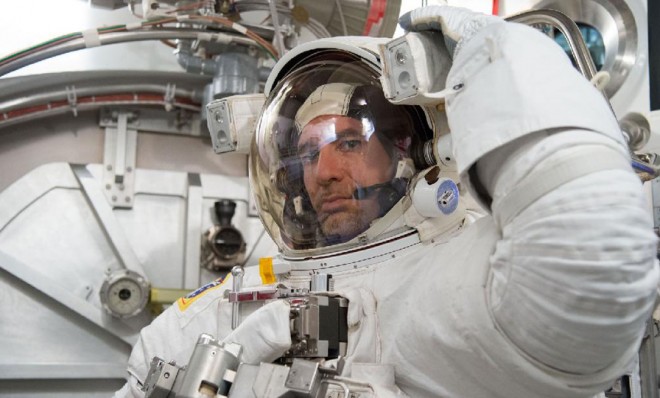Yes, you can drown in space
NASA called off a routine spacewalk today when an astronaut's helmet flooded with water

A free daily email with the biggest news stories of the day – and the best features from TheWeek.com
You are now subscribed
Your newsletter sign-up was successful
As if the cold vacuum of space potentially robbing you of life-giving oxygen weren't scary enough, a routine spacewalk aboard the International Space Station was called off today when an astronaut's helmet filled up with water about an hour into a repair mission.
Liquid behaves differently in low- to zero-gravity, as astronaut Chris Hatfield demonstrated for us in this cool experiment; instead of flowing down it floats and clumps together. Italian astronaut Luca Parmitano got a good look at the phenomenon when his helmet began filling with what appeared to be a half-liter of liquid, drenching his eyes, nose, and mouth, and crippling his ability to hear or speak. Although NASA "seldom cuts a spacewalk short," reported Fox News, Tuesday's accident was the exception, since "Parmitano could have choked on the floating water droplets in his helmet."
In other words: Just imagine all the water floating before your eyes in a bowl just a little larger than your head.
The Week
Escape your echo chamber. Get the facts behind the news, plus analysis from multiple perspectives.

Sign up for The Week's Free Newsletters
From our morning news briefing to a weekly Good News Newsletter, get the best of The Week delivered directly to your inbox.
From our morning news briefing to a weekly Good News Newsletter, get the best of The Week delivered directly to your inbox.
While the source of the fluid is unknown, the likely culprit is his in-suit drinking bag. The pouch is attached to the inside the suit's upper torso with velcro, and allows him to take sips during spacewalks, which can last up to 8 hours at a time. (Apparently, though, Parmitano said the liquid didn't taste like drinking water. Perhaps it mixed with his nervous sweat — and understandably so.)
In Parmitano's case, his crewmates were able to remove his helmet upon re-entering the ISS and towel him off. "He looks miserable. But OK," his spacewalk partner, astronaut Christopher Cassidy, told Mission Control down in Houston.
The mishap highlights just how hapless our fragile human body is when it's crammed into a clunky spacesuit, which is designed to protect us from space's brutal elements (like radiation). Combined with our body's natural impulses, the suit's restrictions can make us extremely uncomfortable: Just ask Alan Shepard, the first American who flew up to space in 1961, but not before soaking himself with urine after hours of delays.
But what happens if you aren't wearing a spacesuit on a spacewalk? According to NASA, "You do not explode and your blood does not boil," as is widely believed — you have the containing power of your skin and circulatory system to thank for that.
A free daily email with the biggest news stories of the day – and the best features from TheWeek.com
You do not instantly freeze because, although the space environment is typically very cold, heat does not transfer away from a body quickly. Loss of consciousness occurs only after the body has depleted the supply of oxygen in the blood. If your skin is exposed to direct sunlight without any protection from its intense ultraviolet radiation, you can get a very bad sunburn. [NASA]
Still, the nightmare scenario painted by today's aborted mission showcases just how much can go wrong when you're 17,000 miles above the Earth.
Officially, only three humans have ever died in outer space: A trio of Russian cosmonauts who asphyxiated aboard 1971's Soyuz 11 spacecraft, when their capsule depressurized prematurely upon re-entry. In one of the more frightening moments in space exploration history, a rescue crew opened the hatch of their apparently undamaged craft, only to find the three cosmonauts still strapped into their seats, unresponsive and lifeless.
-
 ‘Poor time management isn’t just an inconvenience’
‘Poor time management isn’t just an inconvenience’Instant Opinion Opinion, comment and editorials of the day
-
 Bad Bunny’s Super Bowl: A win for unity
Bad Bunny’s Super Bowl: A win for unityFeature The global superstar's halftime show was a celebration for everyone to enjoy
-
 Book reviews: ‘Bonfire of the Murdochs’ and ‘The Typewriter and the Guillotine’
Book reviews: ‘Bonfire of the Murdochs’ and ‘The Typewriter and the Guillotine’Feature New insights into the Murdoch family’s turmoil and a renowned journalist’s time in pre-World War II Paris